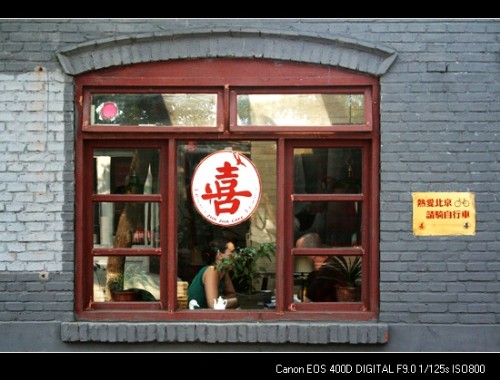 Nanluoguxiang, a newly commercialized hutong popular among foreign tourists and expats in Beijing. (from http://qingying.fotoky.com/)
Nanluoguxiang, a newly commercialized hutong popular among foreign tourists and expats in Beijing. (from http://qingying.fotoky.com/)
After the successful renovations of Yandaixiejie and Nanluoguxiang hutongs, many ordinary alleys also put their rents up.
"In the past, one bedroom in an old hutong cost about 300-400 yuan a month but now I have to pay 500-600 yuan," said Miss Zhu, a tenant living a courtyard.
But despite booming businesses in some areas, only a few hutongs have become prosperous. Many of the hutongs in south Beijing are still facing demolition. Worn-out facilities and a lack of proper heating systems and flush toilets mean many of the old courtyards are no longer attractive to younger generations.
Promoting the neighborhood as a whole when developing businesses is crucial to protecting the hutongs, including devising ways to make tourists stay longer and spend more, said Li Hailong, general manager of the Beijing Liuyinjie Hutong Tour Agency.
Hutong businesses aren't limited to commercial outlets. Jiang Kaixuan is a local Beijing painter and pioneer of the hutong school of drawing. His works have become very popular with collectors. "The hutongs reflect the culture and traditional ideas of grassroots Beijingers," Jiang said.
Jiang's hutong paintings now fetch 8,000 yuan a square foot. A large painting with several square meters might go for hundreds of thousands. Hutong culture and paintings are becoming hot items as Beijing's hutongs disappear at an alarming rate. Beijing had more than 1,000 hutongs in 2000 but now only just over 400 survive.
Hutong conservationists believe that although the new businesses may destroy authenticity, they are, at least, an effective way of physically preserving the hutongs.
"Beijing's courtyards are the cells of the city, and the hutongs are the blood vessels of Beijing culture. From a long-term point of view, tourism development has an advantage over real estate development. Tourism is a lifetime earner while real estate projects provide only temporary returns," said Zhang Wei, creator of the website www.oldbeijing.org.
(China.org.cn July 8, 2008)